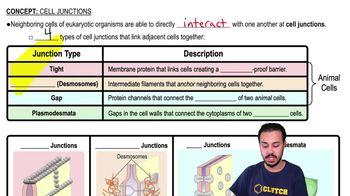Here are the essential concepts you must grasp in order to answer the question correctly.
Extracellular Matrix (ECM)
The extracellular matrix (ECM) is a complex network of proteins and carbohydrates that provides structural and biochemical support to surrounding cells. It plays a crucial role in tissue and organ function, influencing cell behavior, migration, and differentiation. Understanding the ECM is essential for comprehending how various components, including proteoglycans, contribute to cellular environments.
Recommended video:
Proteoglycans
Proteoglycans are large molecules composed of a core protein and one or more glycosaminoglycan (GAG) chains. They are key components of the ECM, providing hydration, structural integrity, and facilitating cell signaling. Their ability to bind water and other molecules makes them vital for maintaining tissue elasticity and resilience.
Cell Signaling
Cell signaling refers to the complex communication processes that govern cellular activities and coordinate responses to external stimuli. In the context of the ECM, proteoglycans can interact with growth factors and other signaling molecules, influencing cellular functions such as proliferation, migration, and differentiation. This interaction is crucial for tissue development and repair.
Recommended video:
 Verified step by step guidance
Verified step by step guidance Verified Solution
Verified Solution


 3:40m
3:40m